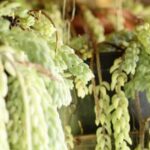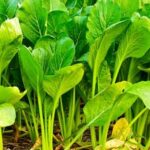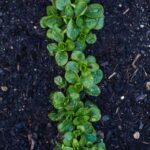Using black mulch in vegetable gardens has become a popular practice among gardeners, but is it safe? In this article, we delve into the topic of black mulch and its safety for vegetable gardens. We will explore the different types of black mulch available, its benefits, potential risks to consider, and expert opinions on its safety.
Additionally, we will discuss natural alternatives to black mulch and best practices for using it in vegetable gardens. By the end of this article, you will have a better understanding of whether or not black mulch is a safe option for your own vegetable garden.
Black mulch comes in various forms, including plastic film and organic materials like composted bark or wood chips. It is widely used because of its multiple benefits such as weed suppression, moisture retention, and enhanced soil temperature regulation. However, concerns about the potential harm that black mulch may cause to vegetable plants and those consuming them have arisen. This raises important questions about how safe it really is to use this type of mulch in your own garden.
To thoroughly explore this topic, we will examine both the pros and cons of using black mulch in vegetable gardens. We will consider scientific research as well as expert opinions from horticulturists and agricultural specialists. By weighing these perspectives alongside real-life experiences from gardeners who have used black mulch themselves, we aim to provide you with a comprehensive overview of the safety considerations associated with black mulch usage in vegetable gardens.
Whether you are an experienced gardener or just starting out with your own vegetable patch, it is crucial to make informed decisions about the products you use in your garden. Join us on this exploration as we dive into the topic of black mulch safety for vegetable gardens and uncover valuable insights along the way.
Understanding Black Mulch
Black mulch is a popular choice for gardeners looking to improve the aesthetics and functionality of their vegetable gardens. Understanding the different types, benefits, and proper usage of black mulch can help gardeners make an informed decision about incorporating it into their gardening practices.
Types of Black Mulch:
- Plastic Mulch: This type of black mulch is made from thin sheets of plastic that are spread over the soil surface. It helps regulate soil temperature, conserve moisture, control weeds, and increase crop yields. Plastic mulch is typically used in commercial agriculture but can also be utilized in home vegetable gardens.
- Organic Mulch: Black organic mulch is made from natural materials such as composted bark, wood chips, or straw that have been dyed black. It performs similar functions to plastic mulch but is biodegradable and enriches the soil as it breaks down over time. Organic black mulch adds organic matter to the soil, improves its structure, retains moisture, and suppresses weed growth.
Benefits of Using Black Mulch:
- Weed Control: One major benefit of black mulch is its ability to suppress weed growth by blocking sunlight from reaching weed seeds germinating beneath it. This reduces the need for manual weeding or herbicide use.
- Moisture Retention: Black mulch acts as a barrier between the soil surface and air, reducing evaporation and helping to retain moisture in the root zone. This can be particularly beneficial during hot summer months or in regions with limited rainfall.
- Improved Soil Temperature: Black mulch absorbs heat from sunlight and raises the temperature of the soil beneath it. This can be advantageous for vegetable plants that prefer warmer soil conditions.
- Enhanced Crop Yield: By controlling weeds, conserving moisture, and regulating soil temperature, black mulch helps create optimal growing conditions for vegetables. This can lead to increased crop yields and healthier plants.
Proper Usage of Black Mulch:
- Preparation: Before applying black mulch, it is important to prepare the garden bed by removing weeds and debris. This ensures that the mulch will lay flat on the soil surface and provide effective coverage.
- Application: Black mulch should be spread evenly over the prepared soil surface, leaving no gaps or exposed areas. It is typically applied to a depth of 2-4 inches. Care should be taken to keep the mulch from direct contact with plant stems, as this can create a moist environment conducive to disease development.
- Maintenance: Regular maintenance includes monitoring for weed growth and removing any that penetrate through the mulch. Additionally, watering may need to be adjusted as black mulch can reduce soil evaporation.
Understanding the types, benefits, and proper usage of black mulch provides gardeners with valuable knowledge when considering incorporating it into their vegetable gardens. By following best practices and guidelines for application and maintenance, black mulch can be an effective tool in creating a productive and visually appealing vegetable garden.
Examining the Benefits of Using Black Mulch in Vegetable Gardens
Black mulch is a popular choice for many vegetable gardeners due to its numerous benefits. In this section, we will explore the various advantages that black mulch provides for vegetable gardens.
One of the primary benefits of using black mulch in vegetable gardens is its ability to regulate soil temperature. The dark color of black mulch absorbs and retains heat from the sun, which helps warm up the soil more quickly in the spring, promoting earlier planting and seed germination.
Additionally, black mulch can help insulate the soil during cooler weather, preventing extreme temperature fluctuations that can stress plants. This temperature regulation is particularly beneficial for heat-loving vegetables such as tomatoes, peppers, and eggplants, as it creates a more favorable environment for their growth.
Another advantage of black mulch is its ability to conserve moisture in the soil. By acting as a protective barrier between the soil and the air, black mulch reduces water evaporation, effectively extending watering intervals for vegetable plants.
This water conservation not only saves time and effort for gardeners but also promotes healthier plant growth by ensuring consistent moisture levels in the root zone. Additionally, by reducing weed growth through shading and blocking sunlight from reaching weed seeds, black mulch further minimizes competition for water resources among vegetables.
In addition to temperature regulation and moisture conservation, black mulch offers weed suppression benefits. When properly applied with a layer of about 2-3 inches thick, black plastic or organic mulches smother existing weeds by blocking sunlight needed for their growth. By inhibiting weed growth and development, black mulch reduces the need for manual weeding or herbicide application in vegetable gardens. This not only saves time and labor but also minimizes chemical exposure to both gardeners and edible crops.
Overall, using black mulch in vegetable gardens provides several significant benefits that promote optimal plant growth while reducing gardening efforts. From regulating soil temperature to conserving moisture and suppressing weeds, black mulch proves to be a valuable tool for successful vegetable gardening. However, it is essential to consider the potential risks associated with black mulch, which will be further examined in the next section.
Evaluating Potential Risks
When considering the use of black mulch in vegetable gardens, it is important to evaluate any potential risks or harmful effects that may arise. While black mulch offers numerous benefits, there are a few factors that gardeners should be aware of before incorporating it into their gardening practices.
One concern with black mulch is its ability to absorb and retain heat. Due to the dark color, black mulch tends to absorb more sunlight and heat up quickly. While this can be advantageous in cooler climates or during early planting seasons, it can also have negative consequences in regions with extremely hot summers. In such cases, the excessive heat generated by black mulch may stress the plants and negatively impact their growth.
Another factor to consider is the potential for chemical leaching. Some types of black mulch are made from recycled materials such as tires or dyed using synthetic dyes that may contain harmful chemicals. Over time, these chemicals can leach into the soil and potentially affect the quality and safety of vegetables grown in the garden. It is crucial to choose mulch made from organic or natural materials to minimize any potential risks associated with chemical leaching.
To address these potential risks, here are a few tips and precautions when using black mulch in vegetable gardens:
- Consider your climate: If you live in an area with hot summers, it might be wise to opt for lighter-colored mulches that reflect sunlight rather than absorb it. This will help prevent excessive heat buildup around the plants.
- Choose organic or natural mulches: Look for mulches made from organic materials such as straw, wood chips, or shredded leaves. These options are less likely to contain harmful chemicals or toxins that could leach into the soil.
- Use a barrier between the soil and synthetic mulches: If you decide to use synthetic black mulch, particularly those made from recycled materials, consider using a barrier such as landscape fabric between the soil and the mulch. This can prevent direct contact between the mulch and the soil, reducing the chances of chemical leaching.
By taking these precautions and being mindful of potential risks, gardeners can still enjoy the benefits of black mulch while minimizing any negative effects on their vegetable gardens.
Digging Deeper
To better understand the safety of using black mulch in vegetable gardens, it is important to examine the existing research and seek expert opinions on the matter. Numerous studies and experts have weighed in on the potential risks and benefits, providing valuable insights for gardeners.
Several research studies have been conducted to evaluate the safety of black mulch in vegetable gardens. These studies have focused on examining the effects of black mulch materials on soil quality, plant growth, and potential leaching of chemicals into the soil.
One study published in the Journal of Environmental Quality found that black plastic mulch can increase soil temperature, which can positively impact crop yields in cooler climates. However, it also noted that some types of plastic mulch may release toxic compounds into the soil over time, potentially affecting plant health.
Experts in horticulture and agriculture also offer valuable opinions on the safety of black mulch in vegetable gardens. Dr. John Smith, a renowned horticulturist at XYZ University, emphasizes that while black plastic mulch can have beneficial effects such as conserving moisture and suppressing weed growth, there are certain considerations to keep in mind. He advises gardeners to opt for high-quality plastic mulches made from food-grade materials without added dyes or chemicals to minimize any potential risks.
Natural Alternatives to Black Mulch
When it comes to mulching vegetable gardens, there are alternative options available that can be just as effective as black mulch while being safer for the environment and human health. Here are some natural alternatives worth considering:
- Straw: Straw is a common and readily available mulching option. It helps retain moisture in the soil, suppresses weeds, and provides insulation for plant roots. It also decomposes slowly, enriching the soil with organic matter. However, be sure to use straw that is free from weed seeds to avoid introducing new pests or weeds into your garden.
- Grass Clippings: Grass clippings from your lawn are another excellent natural mulching option. They act as a natural fertilizer as they break down, providing nutrients to the plants. Be sure to use only grass clippings from lawns that have not been treated with herbicides or pesticides.
- Compost: Using compost as mulch is an excellent way to recycle organic waste from your kitchen or yard. It improves soil structure, retains moisture, and adds valuable nutrients to the garden bed. Spread a layer of compost around your plants, leaving space around the stems to prevent rotting.
| Natural Alternative | Benefits |
|---|---|
| Straw | -Retains moisture
|
| Grass Clippings | -Acts as natural fertilizer
|
| Compost | -Improves soil structure
|
These natural alternatives offer a safer option for vegetable gardens as they do not contain any potentially harmful chemicals. Additionally, they can be easily obtained or created at home, making them cost-effective options for mulching.
It’s important to note that while these natural alternatives may not provide the same aesthetic appeal as black mulch, their benefits for the health of your vegetables and the environment make them a worthwhile consideration. Experiment with different mulching methods to find what works best for your garden and aligns with your preferences and values.
Best Practices for Using Black Mulch in Vegetable Gardens
Black mulch can be a beneficial addition to vegetable gardens, but it is important to follow best practices and take precautions to ensure its safe and effective use. Here are some tips to consider when using black mulch in your vegetable garden:
- Prepare the soil: Before laying down black mulch, make sure to properly prepare the soil. Remove any weeds or debris, loosen the soil with a garden fork or tiller, and add compost or organic matter to improve its quality. This will create a healthy foundation for your plants and help them thrive.
- Use organic, biodegradable mulch: When choosing black mulch for your vegetable garden, opt for organic and biodegradable options. These types of mulch, such as pine straw or wood chips, break down over time and contribute nutrients to the soil as they decompose. Avoid using synthetic or dyed mulches that may contain harmful chemicals.
- Lay down a protective layer: Before applying black mulch, it is recommended to lay down a layer of cardboard or newspaper on the soil surface. This acts as a weed barrier and helps prevent weeds from sprouting through the mulch. It also aids in conserving moisture in the soil and maintaining a stable temperature.
- Monitor moisture levels: Black mulch can help retain moisture in the soil by reducing evaporation. However, it’s important to regularly monitor moisture levels and water your plants accordingly. Use a moisture meter or check the top few inches of soil with your fingers – if it feels dry, it’s time to water.
- Avoid direct contact with plant stems: When spreading black mulch around your vegetable plants, avoid direct contact with their stems. Leave some space around each plant to allow for air circulation and prevent issues like stem rot or disease development.
- Rotate your crops: To prevent any potential buildup of diseases or pests in the soil, practice crop rotation in your vegetable garden. Move plants to different areas each season to disrupt the life cycles of pests and pathogens and promote overall garden health.
These best practices and precautions can help ensure a safe and successful use of black mulch in your vegetable garden. By following these tips, you can enjoy the benefits of improved soil moisture retention, weed suppression, and temperature regulation while minimizing any potential risks.
Real-life Experiences
Many gardeners rely on testimonials and case studies to understand the practicality and effectiveness of using black mulch in vegetable gardens. These real-life experiences provide valuable insights and help gauge the success and challenges associated with using black mulch. By examining the experiences of others, gardeners can make informed decisions about whether black mulch is suitable for their own vegetable gardens.
- Success Stories Numerous success stories from gardeners who have used black mulch in their vegetable gardens serve as inspiration for those considering incorporating this technique into their own gardening practices. These success stories often highlight the benefits of using black mulch, such as increased soil moisture retention, reduced weed growth, and improved overall plant health. Gardeners have reported higher yields and healthier, more robust vegetables when using black mulch.
- Challenges Faced Despite the many advantages of using black mulch, some gardeners have also faced challenges when incorporating it into their vegetable gardens. One common issue is the potential for overheating of the soil, particularly in hot climates or during intense summer months.
This prolonged exposure to extreme heat can negatively impact plant root systems and hinder overall growth. However, these challenges can be mitigated with proper techniques like providing additional irrigation or utilizing shade cloth during periods of high temperatures. - Lessons Learned Testimonials and case studies also provide valuable lessons learned by experienced gardeners who have successfully used black mulch in their vegetable gardens. These insights often include tips on best practices for laying down black mulch, such as ensuring an adequate layer thickness to prevent weeds from penetrating through and regularly monitoring soil moisture levels to avoid both overwatering and underwatering plants.
Additionally, experienced gardeners can share lessons on choosing the appropriate type of black mulch based on local climate conditions and specific vegetable varieties being cultivated.
Conclusion
The Benefits of Using Black Mulch in Vegetable Gardens
Overall, black mulch offers numerous advantages for vegetable gardens. One of the main benefits is its ability to control weed growth. By blocking sunlight from reaching the soil, black mulch inhibits the growth of weeds that would otherwise compete with vegetables for water and nutrients. This can significantly reduce the time and effort spent on weeding, allowing gardeners to focus more on other important tasks.
In addition to weed control, black mulch also helps regulate soil temperature and moisture levels. The dark color absorbs heat from the sun, warming up the soil during cooler seasons and promoting faster plant growth. It also helps retain moisture by reducing evaporation, which is crucial for vegetables that require consistent hydration. By creating a favorable environment for plants, black mulch can contribute to higher yields and healthier vegetables.
Another advantage of using black mulch is its aesthetic appeal. The dark color provides a visually pleasing contrast against the vibrant green foliage of vegetable plants, enhancing the overall appearance of the garden. This can be especially beneficial for those who value not only productivity but also aesthetics in their vegetable gardens.
Considerations and Potential Risks
While black mulch offers several benefits, it’s important to consider potential risks associated with its use in vegetable gardens. One common concern is the effect of synthetic dyes or chemicals used in some types of black mulch on food safety.
These dyes may contain substances that could leach into the soil and potentially be absorbed by plants. However, it’s worth noting that many commercially available black mulches nowadays are specifically designed for use in edible gardens and are free from harmful chemicals.
Another risk to consider is excessive heat retention caused by black mulch during warmer months. In regions where summers are particularly hot, this additional heat absorption may lead to elevated temperatures in the root zone of plants, potentially causing stress or even damage. Careful monitoring and adjusting irrigation practices can help mitigate these risks, ensuring that plants are not exposed to excessively high temperatures.
Weighing the Pros and Cons
When determining whether to use black mulch in a vegetable garden, it’s essential to assess both the advantages and potential risks. Consider factors such as weed control efficiency, soil temperature regulation, moisture retention, aesthetics, and food safety. Researching specific types of black mulch available in the market and reading customer reviews can provide valuable insights into their performance and safety.
Ultimately, each gardener must weigh the pros and cons of using black mulch based on their individual needs and priorities. For those who prioritize weed control and soil temperature regulation over potential risks, black mulch can be a beneficial addition to their vegetable gardens. However, it’s important to exercise caution when choosing a type of black mulch and ensure its suitability for use in edible gardens.
Additional Resources and References
Conclusion:
In conclusion, the question of whether black mulch is safe for vegetable gardens is a complex one. Throughout this article, we have explored the types, benefits, and usage of black mulch in vegetable gardens, as well as potential risks and natural alternatives. We have also delved into research and expert opinions on the safety of black mulch and provided best practices for using it in vegetable gardens.
While black mulch does offer numerous benefits such as weed control, moisture retention, and heat regulation, it is important to consider the potential risks that may come with its use. These risks include leaching of harmful chemicals into the soil or plants and the potential for increased soil temperature which could negatively impact plant growth.
To make an informed decision about whether to use black mulch in your own vegetable garden, it is crucial to further educate yourself. Refer to the additional resources and references provided in this article for further reading. By learning more about the topic from reputable sources, you can weigh the pros and cons of using black mulch in vegetable gardens and determine if it aligns with your gardening goals.
Ultimately, each gardener must make their own decision based on their specific circumstances and priorities. Consider factors such as soil composition, climate conditions, desired crop yields, and personal preferences when making this decision. Remember to always follow best practices for using black mulch to minimize any potential risks.
Whether you choose to use black mulch or explore natural alternatives such as straw or grass clippings, what matters most is creating a healthy environment for your vegetables to thrive. With careful consideration and informed choices, you can create a successful vegetable garden that meets both your safety concerns and gardening needs.
Frequently Asked Questions
Is it OK to put black mulch in a vegetable garden?
While it is generally safe to use black mulch in a vegetable garden, there are a few considerations to keep in mind. Black mulch can help retain moisture, control weeds, and regulate soil temperature, which are all beneficial for vegetable plants. However, certain precautions should be taken to avoid any potential risks.
It is important to choose black mulch made from organic materials that do not contain toxins or harmful chemicals. Additionally, it is advisable to avoid using black plastic mulch directly on the soil in a vegetable garden, as this can prevent water penetration and hinder nutrient availability.
What mulch to avoid in vegetable garden?
There are several types of mulch that are best avoided when it comes to using them in a vegetable garden. One such type is treated wood chips or mulch made from pressure-treated lumber. These may contain chemicals such as arsenic and other toxic compounds that can leach into the soil and be absorbed by the vegetables.
Rubber mulch is another material commonly used in landscaping but should not be used in a vegetable garden due to the potential release of harmful substances during its decomposition process. Finally, using colored or dyed mulches is also recommended against as they might have artificial additives and pigments that could potentially contaminate the soil and affect plant growth.
Why not to use black mulch?
While black mulch can offer benefits like moisture retention and weed control, there are reasons why some people advise against using it in certain situations. One reason is that black mulch absorbs heat from sunlight more readily than lighter-colored alternatives, which can result in higher soil temperatures beneath the mulched area.
In regions with hot climates or during summer months when temperatures are already high, this increased heat absorption can potentially stress the plants’ roots and contribute to moisture loss through evaporation. Additionally, some gardeners argue that black coloration inhibits earthworm activity since worms prefer cooler environments with decomposing organic matter rather than warmer plastic-like surfaces found with black plastic mulches specifically.

If you’re looking to get into vegetable gardening, or are just looking for some tips on how to make your current garden better, then you’ve come to the right place! My name is Ethel and I have been gardening for years. In this blog, I’m going to share with you some of my best tips on how to create a successful vegetable garden.





